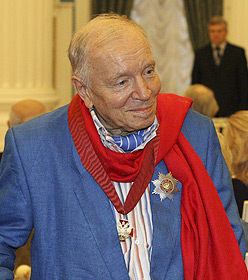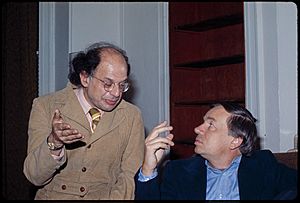Andrei Voznesensky facts for kids
Quick facts for kids
Andrei Voznesensky
|
|
|---|---|

Andrei Voznesensky in 2008
|
|
| Born | Andrei Andreyevich Voznesensky 12 May 1933 Moscow, Soviet Union |
| Died | 1 June 2010 (aged 77) Moscow, Russia |
| Resting place | Novodevichy Cemetery, Moscow |
| Occupation | Poet and writer |
| Period | 1958–2010 |
| Notable works | The Triangular Pear, Antiworlds, Stained-glass Master, Violoncello Oakleaf, Videoms and Fortune Telling by the BookThe Seed" |
Andrei Andreyevich Voznesensky (Russian: Андре́й Андре́евич Вознесе́нский, born May 12, 1933 – died June 1, 2010) was a famous Soviet and Russian poet and writer. People like Robert Lowell called him "one of the greatest living poets in any language."
He was part of a group called the "Children of the '60s." These were new, important Russian thinkers who became popular during a time of more freedom in the Soviet Union, known as the Khrushchev Thaw.
Voznesensky was seen as a very brave writer during the Soviet era. However, his unique writing style sometimes led to criticism. Once, the Soviet leader Nikita Khrushchev even threatened to send him out of the country.
He was very popular and performed his poems in front of huge crowds all over the world. People loved how well he read his poems. Some of his poetry was translated into English by the famous poet W. H. Auden.
Voznesensky's longtime mentor and inspiration was Boris Pasternak. Pasternak was a Nobel Prize winner and wrote the famous book Doctor Zhivago. Before he died, Voznesensky was called "a living classic" and an "icon of Soviet intellectuals."
Contents
Personal life
Andrei Voznesensky was born in Moscow. His father was an engineering professor. His mother helped him love poetry early on by reading it to him. His father worked during World War II.
When he was young, Voznesensky was very interested in painting and architecture. In 1957, he finished his studies at the Moscow Architectural Institute with a degree in engineering. But his love for poetry was even stronger.
As a teenager, he sent his poems to Boris Pasternak. Their friendship greatly influenced the young poet. Voznesensky later wrote about this special bond in his work "I Am Fourteen." He said Pasternak made his life feel magical and full of purpose. Pasternak, who passed away in 1960, praised Voznesensky, saying, "Your entrance into literature was swift and turbulent. I am glad I've lived to see it."
In his later years, Voznesensky became more private. He had a stroke some years before he died. He is thought to have had another stroke in early 2010.
Andrei Voznesensky died on June 1, 2010, at the age of 77. The secretary of the Union of Writers of Russia said he died peacefully at home. Many important Russian leaders and cultural groups shared their sadness. Russian President Dmitry Medvedev and Prime Minister Vladimir Putin sent their condolences.
Voznesensky's wife, Zoya Boguslavskaya, lived longer than him. He was buried in the Novodevichy Cemetery in Moscow on June 4, 2010.
Career
Voznesensky's writing style was seen as very different from other poets in the Soviet Union.
His first poems came out in 1958. They immediately showed his unique way of writing. His poems often used modern ideas and images. They also had unusual metaphors, complex rhythms, and interesting sound effects. Poets like Vladimir Mayakovsky and Pablo Neruda were big influences on him.
One of his early poems, "I Am Goya," was inspired by the artist Francisco Goya. This poem became very famous for showing the fear and horror of war. Another early poem, "Fire in the Architecture Institute," was about a fire at his old school in 1957. Voznesensky later said, "I believe in symbols. I understood that architecture was burned out in me. I became a poet."
In December 1962, Nikita Khrushchev, the Soviet leader, invited Voznesensky and other young Russian thinkers to a party. Khrushchev criticized Voznesensky there, saying, "Just look at this new Pasternak! You want to get a [foreign] passport tomorrow? You want it? And then go away, go to the dogs! Go, go there."
In the 1960s, during the time of more openness called the Khrushchev Thaw, Voznesensky traveled a lot. He visited France, Germany, Italy, the United States, and other countries. He, along with Yevgeny Yevtushenko and Bella Akhmadulina, became very popular. They performed their poems for thousands of cheering fans in stadiums, concert halls, and universities.
He was known for his amazing poetry reading skills. He even competed with famous actors like Laurence Olivier and Paul Scofield at a show in London. He spoke out against the invasion of Czechoslovakia in 1968. While in the United States, he met famous people like Allen Ginsberg, Arthur Miller, and Marilyn Monroe.

Voznesensky was friends with many writers, artists, and thinkers. These friendships often appeared in his poems and essays. Many people know him for the super-hit song Million of Scarlet Roses, which he wrote for singer Alla Pugacheva in 1984. He also wrote the very successful rock opera Juno and Avos (1979). This opera was based on the life of Nikolai Rezanov.
His works have also been turned into plays. A collection of his poems called "Antimiry" ("Anti-worlds") was used for a famous play at the Taganka Theatre in 1965. "Save your Faces" was also performed there. "Juno and Avos" was performed at the Lenin's Komsomol Theater (now Lenkom).
Notable works
- The Triangular Pear (1962)
- First Ice
- Antiworlds (1964)
- Stained-glass Master
- Violoncello Oakleaf
- Videoms and Fortune Telling by the Book
- Arrow in the Wall (1986)
- I am Goya
- A Shallow Paradise
- Dogalypse
- The Parabolic Ballad
- Glance (Vzglyad)
- My Friend's Light
- Her Story
- Russian-American Romance
- Abuses and Awards
- A Ballad (Thesis for a Doctor's Degree)
- Who Are You?
- Rubber Souls
- Fate
- Self-Portrait
- The Song
- Modern Nature
- Milion alykh roz (with music by Raimonds Pauls)
- Story Under Full Sail; A Story of Love and Loss
- Someone is Beating a Woman
- Dogalypse. San Francisco Poetry Reading City Lights Books, The Pocket Poets series: Number 29 (in English)
- The Shadow of the Sound (1970)
- Achilles' Heart (1966)
- Lonjumeau (1963)
- Oza (1964)
Awards and nominations
In 1978, Voznesensky won the USSR State Prize. He was also an honored member of ten academies around the world. These include the Russian Academy of Learning (1993), the American Academy of Arts and Letters, and the Parisian Académie Goncourt.
On December 23, 2008, Russian President Dmitry Medvedev gave Voznesensky a special state award at the Kremlin.
Legacy
A minor planet called 3723 Voznesenskij was named after him. It was found by Soviet astronomer Nikolai Chernykh in 1976.
Honours and awards
- Order "For Merit to the Fatherland";
- 2nd class (May 5, 2008) - for his great work in literature and many years of creative activity
- 3rd class (January 15, 2004) - for his important contributions to Russian literature
- Order of the Red Banner of Labour (1983)
- USSR State Prize (1978) - for his collection "stained glass maker" (1976)
- Voznesensky was an honorary member of ten academies worldwide, including the Russian Academy of Education (1993), the American Academy of Literature and Art, the Bavarian Academy of Fine Arts, the Paris Academy Goncourt brothers and the European Academy of Poetry
- Golden Badge of Honour "Public Recognition" (2003)
See Also
 In Spanish: Andréi Voznesenski para niños
In Spanish: Andréi Voznesenski para niños
 | Georgia Louise Harris Brown |
 | Julian Abele |
 | Norma Merrick Sklarek |
 | William Sidney Pittman |

